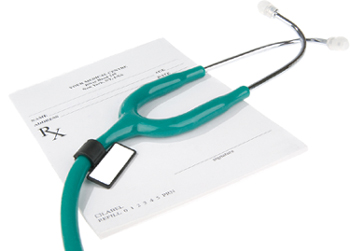
You had to wait weeks for an appointment. Then you sat in the waiting room for 40 minutes. Then you sat 20 minutes more in the examination room. Suddenly, the doctor shows up . . . and in no time, is gone. What should you discuss with your physician, and what should you just leave to the nurse? Here’s how to maximize the precious few minutes that you are allotted with your doctor.
✓ Insurance issues
Confirm whether your doctor accepts your health insurance, and always bring your insurance card with you to your appointments (this is especially important when you’re seeing a new doctor). That way, you’ll know immediately how much your co-pay will be. Doctors don’t usually know the nuts and bolts of each carrier’s coverage—but the office manager does.
✓ Records and referrals
If you’re seeing a doctor or specialist for the first time, you want to be sure that he has all of the information that he needs to treat you: Have all of your medical records (including x-rays, MRIs, and hospital surgical records, if applicable) forwarded to the doctor’s office before your appointment so that he can study them prior to your meeting. You don’t want him to spend his few minutes with you with his nose in a folder. Finally, be sure to bring your referral forms with you, too.
✓ Vitals and weight
When your nurse calls you into the exam room, make sure she takes care of these things before your doctor comes in. You’ve gotten on a scale, urinated in a cup, and had your blood pressure checked so many times that you could practically log the results in on your own. There’s no need to waste time with your doctor on this!
✓ Knowing whether you’re due for yearly tests or shots
Need a flu shot or a tetanus booster? Think you might be due for a routine colonoscopy? Ask the nurse. She’ll consult your records and alert your doctor that these “maintenance” issues need to be taken care of. She might even be able to give you the shots herself.

✓ Symptoms and questions
Most patients wait for the doctors to ask questions. Don’t! Quickly let it be known you have several things you want to talk about. Start with all your recent symptoms. However minor these issues may seem to you, be sure to mention that you get headaches every evening after dinner, and point out that suspicious mole. You may not know whether your symptoms are related to a drug interaction or a virus that’s going around, but your doctor will. Now’s also the time to ask about how your own well-being might relate to health-care issues you’ve heard about on the news (“Should I stop taking the cholesterol drug that’s been shown to increase the risk of stroke?” “Could my upset stomach be caused by that salmonella outbreak?”). Be sure to write down every ache, pain, and question before you see him: You don’t want to forget something important and have to wait for another appointment.
✓ Self-remedies
If you have any chronic health issues, tell your doctor what you are doing to treat yourself. For example, if you have arthritis, you might be doing warm-water aerobics or taking specific vitamin supplements. Find out if what you’re doing is safe and effective given your situation.
✓ Test results specifics
Are your blood results in? What were the results of that biopsy? Get your doc to spill the specifics—that means more than just a “pass/fail” answer. Your cholesterol may read “normal” now, but unless you press for the actual numbers, you may not know that you’re just two points out of the time-to-worry range. Be sure to bring a notebook and record the actual figures, too.
✓ Everything you’re taking, spraying, or rubbing on
Before you see the doc, throw all of those pill bottles on your nightstand into a resealable bag—and don’t forget those vitamins, calcium supplements, eyedrops, and skin creams in your medicine cabinet. (A list will suffice if you carefully record the dosage, frequency, and brand that you’re taking.) Think about it: How would your doctor know if another doc prescribed a medication unless you tell her?
Patients “don’t think that things like low-dose aspirin or hydrocortisone cream ’count,’ because they’re nonprescription items,” says Mary Nolan, RN, admissions nurse at Baystate Franklin Medical Center in Greenfield, Massachusetts. But knowing about them can make a huge difference in how you’re treated: Nolan knows of a patient who was taking atropine eyedrops, which were causing his heart rate to slow down. Until the patient mentioned the drops, the doctor thought he might need a pacemaker!
✓ Changes to your prescription regimen
Once your doctor has taken a look at what you’re taking and heard about new symptoms you may be feeling, she may want to tweak your prescription medication regimen. Here are some questions to ask before she starts scribbling new scripts:
• Are any of my medications now available in generic form? Are there any generic alternatives? Medicines come off patent all the time, which means they become generic. Generic, as we all know, is code for “a heck of a lot cheaper” than brand-name prescriptions.
• How much of that do I really need? To treat acute symptoms, ask your physician to write a prescription only for the minimum amount of medication that he thinks you’ll need. If your condition persists, you can always phone the office and ask for a refill. On the other hand, if you take a drug to treat a chronic condition such as diabetes or arthritis, it may be less expensive to buy three months’ worth via mail order rather than a one-month supply.
• Do you have a sample of that? Doctors get free samples of the newest and most popular drugs—why shouldn’t you get a week or two of free meds? This is an especially good idea if the drug is new to you; if you buy a month’s supply and you have a bad reaction to it, you’ll be out some serious cash.
• How much will that new prescription cost me? Your doctor probably has no idea how much you pay for medications, or how much your prescription plan covers. Speak up about price as soon as she whips out that prescription pad; it's best not to go into sticker shock at the pharmacy!

Don’t let the doctor leave without your having complete clarity about what you should be doing as a result of the visit. Should you schedule a return visit? Change vitamins? Do something different for that symptom? Keep a food or sleep log? Do some research? So often, we leave the doctor’s office more confused than comforted, in large part because of the speed of it all. So your last conversation with the doctor before she scoots out the door should be a summation that makes clear all your next steps.